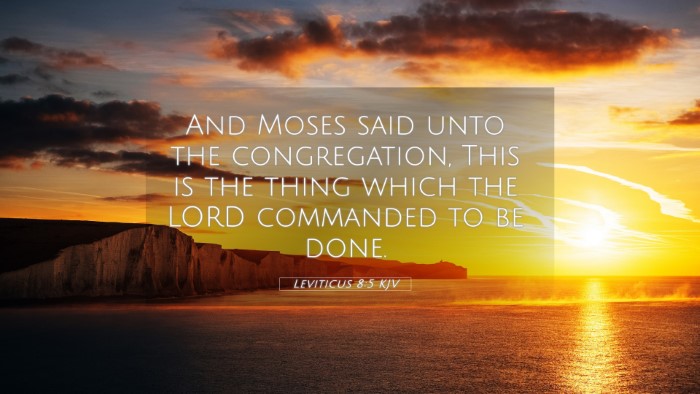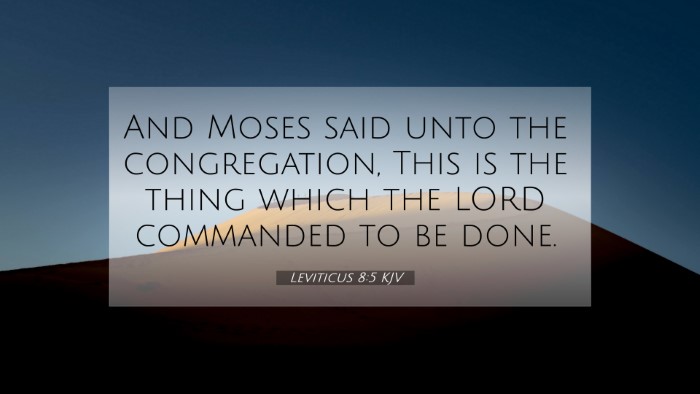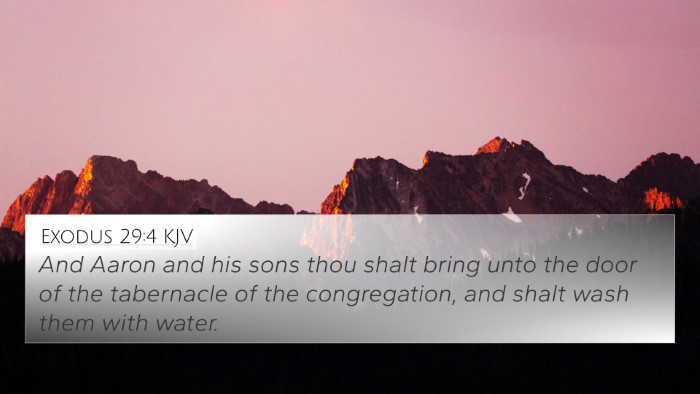Understanding Leviticus 8:5
Leviticus 8:5 states, "And Moses said unto the congregation, This is the thing which the LORD commanded to be done." This verse is instrumental in understanding the divine instructions given to the Israelites regarding ordination and consecration of priests.
Meaning and Significance of Leviticus 8:5
The verse illustrates Moses’ role as the mediator between God and the people, emphasizing the necessity of obedience to God’s commands. The context of this verse is pivotal, as it lays the groundwork for the sacred rituals that follow.
Insights from Commentaries
- Matthew Henry: Henry describes this as a divinely ordained ceremony, showcasing that the duties and responsibilities of the priests are grounded in the command from God. Moses' declaration to the congregation signifies the importance of community acknowledgment of God's mandates.
- Albert Barnes: Barnes emphasizes the formal nature of the command. He notes that Moses calls the people together to ensure that they understand the solemnity of the ordination process, thus highlighting the communal aspect of worship and adherence to God’s law.
- Adam Clarke: Clarke remarks on the significance of the phrase "the thing which the LORD commanded." He underscores the idea that the rituals and ceremonies are not arbitrary but stem from divine order, thereby reinforcing the authority of God's instructions and the importance of proper adherence.
Key Themes
- Divine Authority: The verse showcases the principle that all religious practices derive their weight and significance from God's command, not human invention.
- Community Engagement: Moses’ proclamation to the congregation invites collective participation and awareness of the sacred rituals taking place within their community.
- Obedience to God's Word: There is a clear call to adhere strictly to the commands of God as a form of worship and respect for His authority.
Cross-References
Leviticus 8:5 can be cross-referenced with the following verses, which help highlight the connections between different passages and their shared themes:
- Exodus 19:5-6: God’s call for Israel to be a kingdom of priests and a holy nation prepares the way for the ordination process discussed in Leviticus.
- Numbers 3:10: Discusses the assignment of the priesthood emphasizing the weight of carrying out God’s commands.
- 1 Peter 2:9: The New Testament parallel which denotes believers as a royal priesthood, linking Old Testament practices with New Covenant believers.
- Hebrews 5:4: Acknowledges that no one takes this honor upon themselves but must be called by God, solidifying the necessity of divine command in ordination.
- Deuteronomy 4:2: Addresses the importance of not adding or taking away from God’s commands, reinforcing the theme of obedience.
- Malachi 2:7: Speaks to the role of priests as messengers of the Lord, ensuring that they convey His laws accurately.
- Matthew 28:19-20: Jesus’ command to make disciples parallels the instructive nature of Leviticus, emphasizing the directive nature of God's call to ministry.
Exploring Thematic Connections
Thematic elements in Leviticus 8:5 reveal much about the character of God and His expectations of His people. Here are some elements that can be further explored through cross-referencing:
- Covenantal Relationship: The emphasis on commands and observance reflects the covenant relationship that God forged with His people.
- The Role of Leadership: The ordination of priests symbolizes the importance of spiritual leaders who guide the community in worship and adherence to God's commands.
- Holiness and Sacrifice: The dedication of priests sets a standard of holiness and the sacrificial nature of worship that is reiterated throughout scripture.
Conclusion
Leviticus 8:5 serves as a vital intersection of law, community, and divine authority within the biblical narrative. The careful observation of Moses' actions and words illustrates that understanding God’s directives is essential for all believers. The connections across various scriptures enrich our understanding of the significance of this verse and its implications for both the Old and New Testament practices.
Additional Study Resources
- Bible Concordance: A tool for finding specific references and themes related to Leviticus 8:5.
- Bible Cross-Reference Guide: This helps in navigating through similar texts and understanding broader biblical context.
- Cross-Reference Bible Study: Engaging in a systematic study using cross-references can yield deeper insights into themes and doctrines.
Further Exploration
For those seeking further insights, consider how to expand your knowledge using tools for Bible cross-referencing. Engaging with the scriptures in a thematic manner allows for a greater comprehension of how verses relate to each other and the overall narrative of the Bible.



